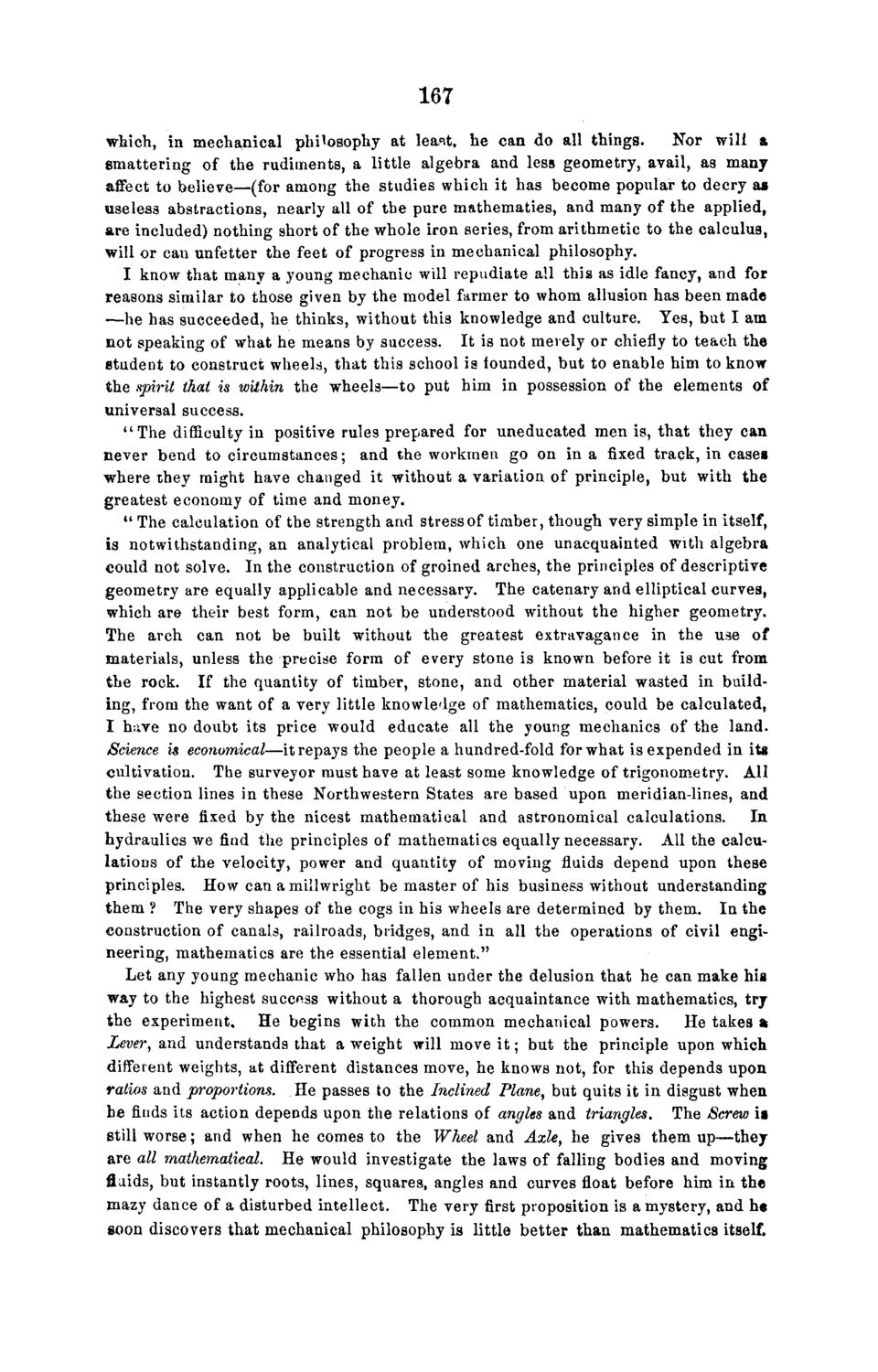| |
| |
Caption: Board of Trustees Minutes - 1868
This is a reduced-resolution page image for fast online browsing.

EXTRACTED TEXT FROM PAGE:
167 which, in mechanical philosophy at leant, he can do all things. Nor will & smattering of the rudiments, a little algebra and less geometry, avail, as many affect to believe—(for among the studies which it has become popular to decry as useless abstractions, nearly all of the pure mathematics, and many of the applied, are included) nothing short of the whole iron series, from arithmetic to the calculus, will or can unfetter the feet of progress in mechanical philosophy. I know that many a young mechanic will repudiate all this as idle fancy, and for reasons similar to those given by the model farmer to whom allusion has been made —he has succeeded, he thinks, without this knowledge and culture. Yes, but I am not speaking of what he means by success. It is not merely or chiefly to teach the student to construct wheels, that this school is founded, but to enable him to know the spirit that is within the wheels—to put him in possession of the elements of universal success. "The difficulty in positive rules prepared for uneducated men is, that they can never bend to circumstances; and the workmen go on in a fixed track, in cases where they might have changed it without a variation of principle, but with the greatest economy of time and money. 44 The calculation of the strength and stress of timber, though very simple in itself, is notwithstanding, an analytical problem, which one unacquainted with algebra could not solve. In the construction of groined arches, the principles of descriptive geometry are equally applicable and necessary. The catenary and elliptical curves, which are their best form, can not be understood without the higher geometry. The arch can not be built without the greatest extravagance in the use of materials, unless the precise form of every stone is known before it is cut from the rock. If the quantity of timber, stone, and other material wasted in building, from the want of a very little knowledge of mathematics, could be calculated, I have no doubt its price would educate all the young mechanics of the land. Science is economical—it repays the people a hundred-fold for what is expended in its cultivation. The surveyor must have at least some knowledge of trigonometry. All the section lines in these Northwestern States are based upon meridian-lines, and these were fixed by the nicest mathematical and astronomical calculations. In hydraulics we find the principles of mathematics equally necessary. All the calculations of the velocity, power and quantity of moving fluids depend upon these principles. How can a millwright be master of his business without understanding them ? The very shapes of the cogs in his wheels are determined by them. In the construction of canals, railroads, bridges, and in all the operations of civil engineering, mathematics are the essential element." Let any young mechanic who has fallen under the delusion that he can make his way to the highest success without a thorough acquaintance with mathematics, try the experiment. He begins with the common mechanical powers. He takes a Lever, and understands that a weight will move i t ; but the principle upon which different weights, at different distances move, he knows not, for this depends upon ratios and proportions. He passes to the Inclined Plane, but quits it in disgust when he finds its action depends upon the relations of angles and triangles. The Screw is still worse; and when he comes to the Wheel and Axle, he gives them up—they sxe'all mathematical. He would investigate the laws of falling bodies and moving flaids, but instantly roots, lines, squares, angles and curves float before him in the mazy dance of a disturbed intellect. The very first proposition is a mystery, and h« soon discovers that mechanical philosophy is little better than mathematics itself.
| |